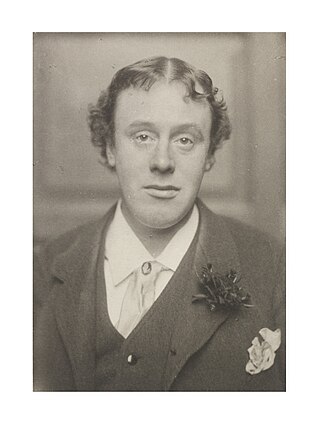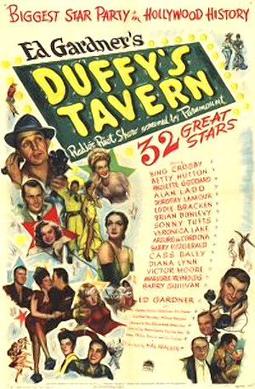
Lord Alfred Bruce Douglas, also known as Bosie Douglas, was an English poet and journalist, and a lover of Oscar Wilde. At Oxford he edited an undergraduate journal, The Spirit Lamp, that carried a homoerotic subtext, and met Wilde, starting a close but stormy relationship. Douglas's father, the Marquess of Queensberry, abhorred it and set out to humiliate Wilde, publicly accusing him of homosexuality. Wilde sued him for criminal libel, but some intimate notes were found and Wilde was later imprisoned. On his release, he briefly lived with Douglas in Naples, but they had separated by the time Wilde died in 1900. Douglas married a poet, Olive Custance, in 1902 and had a son, Raymond.

Count Eric StanislausStenbock was a Baltic Swedish poet and writer of macabre fantastic fiction.

"Annabel Lee" is the last complete poem composed by American author Edgar Allan Poe. Like many of Poe's poems, it explores the theme of the death of a beautiful woman. The narrator, who fell in love with Annabel Lee when they were young, has a love for her so strong that even angels are envious. He retains his love for her after her death. There has been debate over who, if anyone, was the inspiration for "Annabel Lee". Though many women have been suggested, Poe's wife Virginia Eliza Clemm Poe is one of the more credible candidates. Written in 1849, it was not published until shortly after Poe's death that same year.
Kenneth Searight was the creator of the international auxiliary language Sona. His book Sona; an auxiliary neutral language outlines the language's grammar and vocabulary. Encounters with Searight also influenced English author E.M. Forster's world-view, particularly with regard to soldiers.
The Uranians were a late-19th-century and early-20th-century clandestine group of up to several dozen male homosexual poets and prose writers who principally wrote on the subject of the love of adolescent boys. In a strict definition they were an English literary and cultural movement; in a broader definition there were also American Uranians. The movement reached its peak between the late 1880s and mid 1890s, but has been regarded as stretching between 1858, when William Johnson Cory's poetry collection Ionica appeared, and 1930, the year of publication of Samuel Elsworth Cottam's Cameos of Boyhood and Other Poems and of E. E. Bradford's last collection, Boyhood.
Edwin Emmanuel Bradford was an English clergyman and a Uranian poet and writer of stories, articles and sermons. His prolific verse celebrating the high spiritual status of love between men and boys was remarkably well-received and favourably reviewed in his lifetime.

John Gambril (Francis) Nicholson (1866–1931) was an English school teacher, poet, and amateur photographer. He was one of the Uranians, a clandestine group of British men who wrote poetry idealizing the beauty and love of adolescent boys. As a school master at various boarding schools in England and Wales, Nicholson formed "passionate friendships" with some of his students, and dedicated much of his poetry to favoured students.

Rudolf John Frederick Lehmann was an English publisher, poet and man of letters. He founded the periodicals New Writing and The London Magazine, and the publishing house of John Lehmann Limited.

Martin Booth was an English novelist and poet. He also worked as a teacher and screenwriter, and was the founder of the Sceptre Press.

Homoeroticism is sexual attraction between members of the same sex, including both male–male and female–female attraction. The concept differs from the concept of homosexuality: it refers specifically to the desire itself, which can be temporary, whereas "homosexuality" implies a more permanent state of identity or sexual orientation. It has been depicted or manifested throughout the history of the visual arts and literature and can also be found in performative forms; from theatre to the theatricality of uniformed movements. According to the Oxford English Dictionary, it is "pertaining to or characterized by a tendency for erotic emotions to be centered on a person of the same sex; or pertaining to a homo-erotic person."

Gilbert Frankau was a popular British novelist. He was known also for verse, including a number of verse novels, and short stories. He was born in London into a Jewish family but was baptised as an Anglican at the age of 13. After education at Eton College, he went into the family cigar business and became managing director on his twenty-first birthday, his father, Arthur Frankau, having died in November 1904. A few months before his death, at sixty-eight, from lung cancer, he converted to Roman Catholicism.
Greek love is a term originally used by classicists to describe the primarily homoerotic customs, practices, and attitudes of the ancient Greeks. It was frequently used as a euphemism for both homosexuality and pederasty. The phrase is a product of the enormous impact of the reception of classical Greek culture on historical attitudes toward sexuality, and its influence on art and various intellectual movements.
'Greece' as the historical memory of a treasured past was romanticised and idealised as a time and a culture when love between males was not only tolerated but actually encouraged, and expressed as the high ideal of same-sex camaraderie. ... If tolerance and approval of male homosexuality had happened once—and in a culture so much admired and imitated by the eighteenth and nineteenth centuries—might it not be possible to replicate in modernity the antique homeland of the non-heteronormative?

X. J. Kennedy is an American poet, translator, anthologist, editor, and author of children's literature and textbooks on English literature and poetry. He was long known as Joe Kennedy; but, wishing to distinguish himself from Joseph P. Kennedy, he added an "X" as his first initial.
This article lists all known poems by American author and critic Edgar Allan Poe, listed alphabetically with the date of their authorship in parentheses.

John Moray Stuart-Young (1881–1939) was an English Uranian poet, memoirist, novelist and merchant trader. Stuart-Young published numerous works, including books of poetry, novels, descriptions of African life and autobiographical works. His poems are closely linked to fin-de-siècle and Uranian themes, being informed by decadence, colonialism, and pederasty.
William Henry Leonard Poe, often referred to as Henry Poe, was an American sailor, amateur poet and the older brother of Edgar Allan Poe and Rosalie Poe.
The Press of James A. Decker was a poetry publishing house once located in the tiny hamlet of Prairie City, Illinois. Created in 1937 by James A. Decker, the press carried the full name of its founder until 1948 when the imprint was shortened to simply the Decker Press. The Decker Press received national attention in the 1940s, when it published work by famous authors such as Edgar Lee Masters, August Derleth, Hubert Creekmore, William Everson, David Ignatow, Kenneth Patchen, Kenneth Rexroth and Louis Zukofsky. The small press was noted as one of the most prolific publishers of poetry in the country at the time, but the business was plagued by financial issues until the press came to a sudden end in 1950 with a murder-suicide case.

Dorothy Leigh Sayers was an English crime novelist, playwright, translator and critic.

Duffy's Tavern is a 1945 American comedy film directed by Hal Walker and written by Melvin Frank and Norman Panama. The film stars Ed Gardner, Bing Crosby, Betty Hutton, Paulette Goddard, Alan Ladd, Dorothy Lamour, Eddie Bracken and Brian Donlevy. The film was released on September 28, 1945, by Paramount Pictures.












